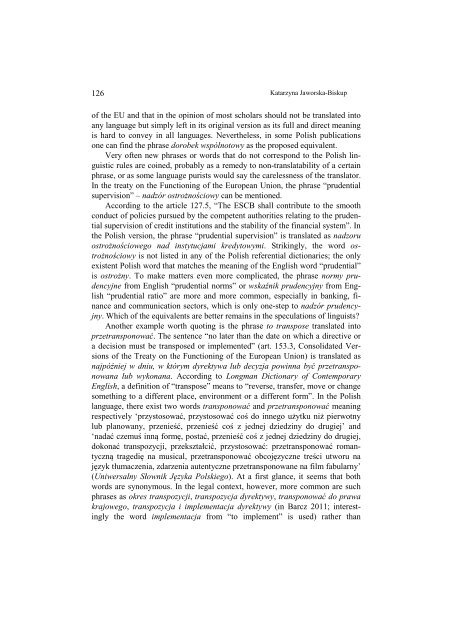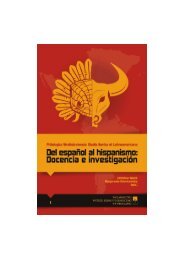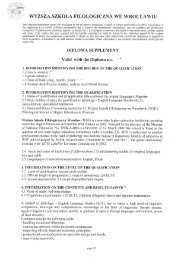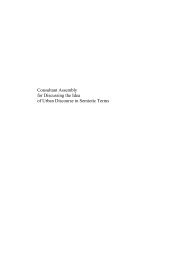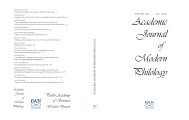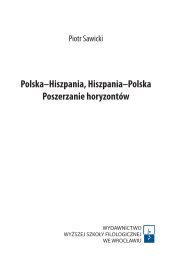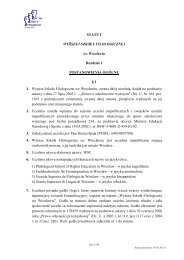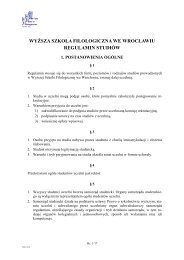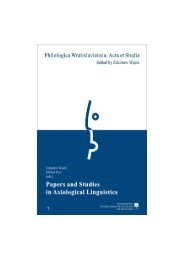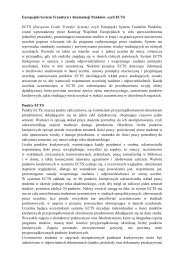s - Wyższa SzkoÅa Filologiczna we WrocÅawiu
s - Wyższa SzkoÅa Filologiczna we WrocÅawiu
s - Wyższa SzkoÅa Filologiczna we WrocÅawiu
Create successful ePaper yourself
Turn your PDF publications into a flip-book with our unique Google optimized e-Paper software.
126<br />
Katarzyna Jaworska-Biskup<br />
of the EU and that in the opinion of most scholars should not be translated into<br />
any language but simply left in its original version as its full and direct meaning<br />
is hard to convey in all languages. Nevertheless, in some Polish publications<br />
one can find the phrase dorobek wspólnotowy as the proposed equivalent.<br />
Very often new phrases or words that do not correspond to the Polish linguistic<br />
rules are coined, probably as a remedy to non-translatability of a certain<br />
phrase, or as some language purists would say the carelessness of the translator.<br />
In the treaty on the Functioning of the European Union, the phrase “prudential<br />
supervision” – nadzór ostrożnościowy can be mentioned.<br />
According to the article 127.5, “The ESCB shall contribute to the smooth<br />
conduct of policies pursued by the competent authorities relating to the prudential<br />
supervision of credit institutions and the stability of the financial system”. In<br />
the Polish version, the phrase “prudential supervision” is translated as nadzoru<br />
ostrożnościo<strong>we</strong>go nad instytucjami kredytowymi. Strikingly, the word ostrożnościowy<br />
is not listed in any of the Polish referential dictionaries; the only<br />
existent Polish word that matches the meaning of the English word “prudential”<br />
is ostrożny. To make matters even more complicated, the phrase normy prudencyjne<br />
from English “prudential norms” or wskaźnik prudencyjny from English<br />
“prudential ratio” are more and more common, especially in banking, finance<br />
and communication sectors, which is only one-step to nadzór prudencyjny.<br />
Which of the equivalents are better remains in the speculations of linguists?<br />
Another example worth quoting is the phrase to transpose translated into<br />
przetransponować. The sentence “no later than the date on which a directive or<br />
a decision must be transposed or implemented” (art. 153.3, Consolidated Versions<br />
of the Treaty on the Functioning of the European Union) is translated as<br />
najpóźniej w dniu, w którym dyrektywa lub decyzja powinna być przetransponowana<br />
lub wykonana. According to Longman Dictionary of Contemporary<br />
English, a definition of “transpose” means to “reverse, transfer, move or change<br />
something to a different place, environment or a different form”. In the Polish<br />
language, there exist two words transponować and przetransponować meaning<br />
respectively ‘przystosować, przystosować coś do innego użytku niż pierwotny<br />
lub planowany, przenieść, przenieść coś z jednej dziedziny do drugiej’ and<br />
‘nadać czemuś inną formę, postać, przenieść coś z jednej dziedziny do drugiej,<br />
dokonać transpozycji, przekształcić, przystosować: przetransponować romantyczną<br />
tragedię na musical, przetransponować obcojęzyczne treści utworu na<br />
język tłumaczenia, zdarzenia autentyczne przetransponowane na film fabularny’<br />
(Uni<strong>we</strong>rsalny Słownik Języka Polskiego). At a first glance, it seems that both<br />
words are synonymous. In the legal context, ho<strong>we</strong>ver, more common are such<br />
phrases as okres transpozycji, transpozycja dyrektywy, transponować do prawa<br />
krajo<strong>we</strong>go, transpozycja i implementacja dyrektywy (in Barcz 2011; interestingly<br />
the word implementacja from “to implement” is used) rather than


